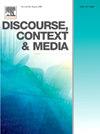最好的观点来自最艰难的攀登:Instagram上不孕症讨论中的身份和社区
IF 3.1
2区 文学
Q1 COMMUNICATION
引用次数: 0
摘要
社交媒体已经成为我们如何看待和构建自己身份的有影响力的平台,比如健康和疾病身份;尤其是Instagram,它是一个被广泛使用的平台,可以围绕某些疾病或医疗轨迹建立社区。因此,本文研究了正在接受生育治疗的女性如何在Instagram账户上构建自己的身份和不孕不育和生育治疗的经历。我们分析了来自5个英语账户和5个荷兰账户的111个公开Instagram帖子和10个简介。我们在ATLAS中对数据进行定性编码。并运用语篇分析的方法,对主要趋势的摘要进行分析。我们的研究结果表明,这些Instagram用户将自己和其他社区成员构建为专家患者/客户、潜在父母、战士和旅行者、失败身体的所有者和不孕倡导者。这些身份与不孕症的构建密不可分,因为它具有深刻的心理和社会影响。这些方面在Instagram的背景下可能更容易讨论,因为可以匿名分享一个通常仍是禁忌的话题,还有其他一些原因。此外,当用户突出他们高度个性化的个人体验时,这些话语结构具有隐性和显性的社区建设功能,因此也产生和塑造了集体身份。例如,这种社区建设通过标签和互动元素、共享特定(医学)术语和使用特定表情符号来实现。总而言之,我们的研究显示了Instagram是如何被用作一个平台来突出生育护理中复杂、独特和高度个人化的体验的。这似乎往往伴随着(被认为)缺乏能动性,而与此同时,不孕症认为健康和医疗保健是可延展和可控的。我们的数据表明,处理不孕症不仅是一种医学问题,也是一种心理和社会经历。与此同时,在Instagram上讨论这个问题会带来特定的(可感知的)支持,以及围绕去污名化和社区建设的复杂、有时甚至是对立的动态。这些发现对卫生保健提供者很有用,因为它们提供了对客户体验及其对社交媒体信息和支持的使用的见解。本文章由计算机程序翻译,如有差异,请以英文原文为准。
The best views come after the hardest climbs: Identity and community in infertility discourse on Instagram
Social media have become influential platforms in how we see and construct our identities, such as health and illness identities; Instagram in particular is a much-used platform to build communities around certain illnesses or medical trajectories. This paper therefore examines how women who are undergoing fertility treatment construct their identity and their experiences with infertility and fertility treatment on their Instagram accounts. We analysed 111 public Instagram posts and 10 bios from 5 English accounts and 5 Dutch accounts. We qualitatively coded the data in ATLAS.ti, and used discourse analytical methods to analyse extracts illustrating main trends.
Our results show that these Instagram users construct themselves and other community members as expert patients/clients, prospective parents, warriors and travellers, owners of a failing body, and infertility advocates. These identities are inextricably tied to the construction of infertility as having a profound psychological and social impact. These are aspects that are possibly easier to discuss in the context of Instagram, because of the possibility to share anonymously about a subject that is often still taboo, among other reasons. Additionally, while users foreground their highly personal, individual experience, these discursive constructions have an implicit and explicit community-building function, and consequently also generate and shape collective identities. This community building for instance happens through hashtags and interactional elements, shared specific (medical) terminology, and the use of specific emoji.
To conclude, our study shows how Instagram is used as a platform to highlight the complex, unique and highly personal experience of being in fertility care. This often seems to come with a (perceived) lack of agency, while at the same time, infertility perceives health and health care as malleable and controllable. Our data reflects that dealing with infertility is not just a medical, but also a psychological and social experience. At the same time, discussing this on Instagram comes with specific (perceived) affordances, and complex and sometimes antithetical dynamics around destigmatisation and community-building. These findings are useful for health care providers as they provide insight in clients’ experiences and their use of social media information and support.
求助全文
通过发布文献求助,成功后即可免费获取论文全文。
去求助

 求助内容:
求助内容: 应助结果提醒方式:
应助结果提醒方式:


